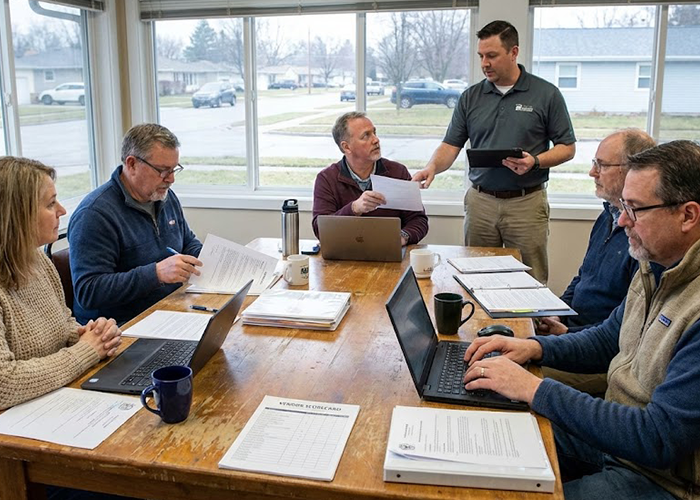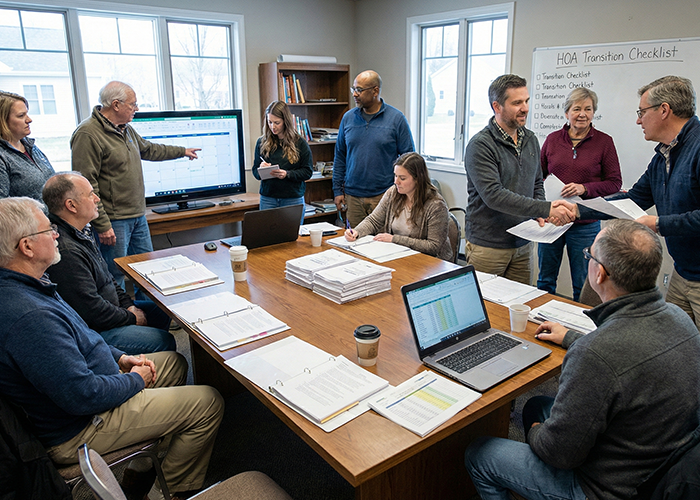Saying ‘HOA Property Managers’? Here’s What You Mean

Many homeowners and even board members use the term HOA property managers to describe individuals or firms assisting with the operations of a homeowners association. While the phrase is frequently used, it’s not technically a formal title. On top of that, it can create confusion about the responsibilities involved.
Browse By Category
Sign up for Our Newsletter
Many homeowners and even board members use the term HOA property managers to describe individuals or firms assisting with the operations of a homeowners association. While the phrase is frequently used, it’s not technically a formal title. On top of that, it can create confusion about the responsibilities involved.
Why the Term ‘HOA Property Managers’ Gets Used
The phrase HOA property managers has grown in popularity as a shorthand way to refer to professionals involved in community operations. It blends two established titles into one: HOA manager and property manager.
In practice, however, those two roles differ in purpose, scope, and reporting structure. However, HOA boards, residents, and vendors need to know their differences.
Understanding the Roles: HOA Manager vs Property Manager
The distinction between an HOA manager and a property manager is often misunderstood. Yes, both contribute to property-related oversight, but their responsibilities differ significantly.
What is an HOA Manager?
An HOA manager (sometimes also known as a community association manager) works directly on behalf of an HOA and its board of directors. This role entails maintaining community-wide standards, supporting governance, managing budgets, coordinating maintenance of shared spaces, and enforcing rules and regulations.
The typical responsibilities of an HOA manager usually include:
- Preparing meeting agendas, reports, and minutes
- Assisting with annual budget planning and financial reporting
- Overseeing common area repairs and capital projects
- Enforcing community rules and design guidelines
- Managing vendors and contracts on behalf of the HOA
HOA managers do not manage individual homeowner properties or rental units. Their clients are HOAs as collective bodies.
What is a Property Manager?
A property manager typically works for an individual property owner or landlord and oversees rental units, tenants, and related maintenance tasks. Property managers are focused on maximizing rental income and preserving the condition of private properties, not on managing shared community areas.
The everyday duties of a property manager include:
- Marketing and leasing rental units
- Collecting rent and managing tenant relations
- Handling repairs and maintenance for individual units
- Enforcing lease agreements and handling evictions
- Overseeing move-ins and move-outs
A property manager’s duties stop at the front door of the unit. They do not handle community-wide concerns unless specifically contracted to do so, and in the rare case that they do, it’s usually in a limited capacity.
What People Might Mean by ‘HOA Property Managers’

The phrase HOA property managers is often used as a convenient, albeit imprecise, label. Here are a few common interpretations:
1. An HOA Manager Who Oversees Community Property
People may use property to refer to common areas, like clubhouses, pools, or fitness centers.. An HOA manager responsible for maintaining these spaces may be loosely called a “property manager,” even though the role is more accurately described as an HOA manager.
2. A Property Manager Working Within an HOA Community
A property manager might manage a rental unit within an HOA community and must interact with the association on rules compliance or maintenance coordination. However, their role remains limited to the individual unit, not the HOA itself.
3. A Misunderstood Job Title
Some homeowners assume that all managers within a residential community are property managers. This can lead to confusion about responsibilities and expectations.
Why the Distinction Matters
Using the correct terminology is more than a matter of semantics. The differences have real implications for communication, vendor contracts, and resident expectations.
Inaccurate use of job titles can also impact liability and contractual obligations. When boards and management companies use precise language, they reduce the risk of misunderstandings.
When You Should Use ‘HOA Manager’ or ‘Property Manager’
The appropriate title depends on the scope of work being referenced:
- Use ‘HOA manager’ when referring to professionals responsible for managing the association, its governance, and community common areas.
- Use ‘property manager’ when referring to individuals hired to manage specific private homes or rental units.
While the term HOA property managers may be acceptable in casual conversation, it’s best to avoid using it in formal documents, contracts, or RFPs. Clarity around these roles helps ensure the right expectations are set for residents and management professionals.
The Role of an HOA Management Company

When an HOA contracts with a community association management company, it’s typically seeking comprehensive support for operational, financial, and administrative tasks. This may include:
- Regular site inspections and common area upkeep
- Budget preparation and reserve planning
- Vendor selection and oversight
- Enforcement of covenants and architectural standards
- Support for board meetings, elections, and communications
These companies assign experienced HOA managers who specialise in community association governance. They do not act as property managers for individual homeowners or manage private rental properties unless contracted separately.
Can One Person be Both an HOA and Property Manager?
In rare cases (for example, in small or self-managed HOAs), one individual may serve as both a property manager and an HOA manager. However, this arrangement can create potential conflicts of interest. It also requires the individual to clearly separate their responsibilities when serving the association rather than an individual property owner.
Professional management companies typically avoid combining the two roles to maintain transparency and proper chain of accountability.
When is ‘HOA Property Managers’ the Right Term?
Proper use of ‘HOA Property Managers’ would depend on the context. If someone uses’ HOA property managers’ informally to refer to managers overseeing a community’s shared assets, the intent is usually understood. However, it’s better to use precise terms in formal HOA operations, legal agreements, or communications.
Boards should refer to ‘HOA managers’ or’ community association managers ‘when discussing those handling the HOA’s business. ‘Property manager should be reserved for professionals managing individual units or homes.
Keeping Things Clear
Clarity and accuracy are important in any conversation. The same goes for HOA managers and property managers. Knowing the difference helps keep everyone involved with the community on the same page.
Looking to improve operations in your HOA community? Let professional HOA managers help you out! Check out our online directory today for your area’s best HOA management companies!
Related Articles:
Trending Now
Related Article
Sign up for Our Monthly Newsletter
Sign up below for monthly updates on all HOA Resource















